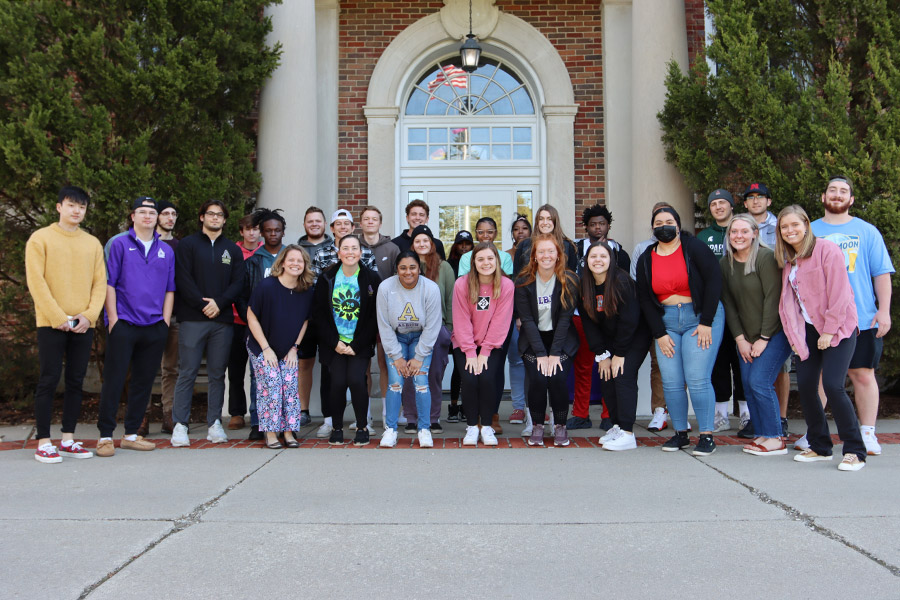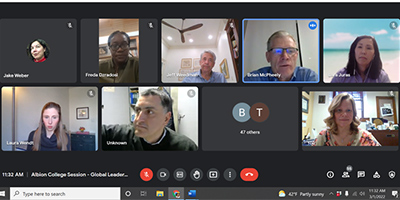E&M Students Gain Experience in Real-Time, Cross-Cultural Communication
Dr. Vicki Baker’s human resources class virtually brings together classrooms on four continents in a project for the Global Liberal Arts Alliance.
April 15, 2022

Dr. Vicki Baker (front row, left) and her Human Resource Management students outside Robinson Hall.
By Jake Weber
For busy students, finding a time to meet is often a challenge, especially when those students are on four different continents. Amazingly, says Taylor McAninch, ’22, they were making it work—until early March.
“We all didn’t realize that some people went on Daylight Savings Time, but others didn’t,” McAninch says. “We had to cancel class one day because one team didn’t show up.”
This type of real-world teachable moment was a surprise, but also part of the plan, says Albion economics and management professor Dr. Vicki Baker, who created the multinational project for the Global Liberal Arts Alliance (GLAA). Her Human Resource Management students, working on team projects with peers in Ghana, Ecuador and Greece, are learning a lot about cross-cultural communication, and sometimes the surprises are quite valuable.
Hearing Different Perspectives
The 60 students across the four classes were divided into smaller groups, each researching a topic that had both human resource management and international aspects. “My team decided to look at women in banking,” says McAninch. “This industry is very similar in all our countries, so we thought that would make it easier to compare and contrast our findings.”
As it turned out, the group found a lot more to compare than to contrast, says McAninch. “For all our countries, women are about 50% of the people who enter banking, but as you go up to senior levels, there are less and less of them,” she says. ”Women are treated differently in our different cultures, yet this underrepresentation is the same everywhere.”
Zac Besant, ’22, was elected a leader of his team, which looked at talent recruitment. As with McAninch’s team, Besant’s group saw that in all four countries hiring a diverse workforce is a priority, but “everyone is approaching it in a different way,” Besant says. He went on to explain that Google (the American company his team studied with the help of Dannie Fountain, ’14) encourages potential employees to share a number of different identities, while their Ghanaian model company focuses on expanding opportunities for women.
“I felt like we could really learn a lot from how other countries are working on talent acquisition and diversity,” Besant says. “The solution isn’t how we do things in America; with a global perspective, we can look at what’s not working for us and learn from each other.”

Dr. Baker organized an interactive panel discussion for all four schools, featuring four Albion alumni with globe-spanning careers in international business: Brian McPheely, ’78, global CEO of Pratt Industries and an Albion College trustee; Lara Juras, ’91, executive vice president/chief people and culture officer for the Minnesota Vikings; Laura Wendt, ’13, human resources business partner for Ford Motor Company Technology and Software operations; and Jeffrey Weedman, ’75, retired vice president of global/business development for the Procter & Gamble Company and a current Albion College trustee. “Their time, insights and knowledge were so invaluable to all of our global partners,” Baker says. “How fortunate we are to have such alumni who are so eager to support our current students.”
The cross-cultural communication lessons were often more informal. Referring to the meetings with just Baker and the Albion class, “We are pretty informal and discuss our topics in a more personal style,” Besant says. In contrast, he noticed the other students and professors seemed to interact more formally. “It works both ways,” he says of the different teaching and learning methods. “It was cool to see that different perspective.”
“When our team got into the group meetings, the Albion students were all, ‘Let’s get this done,’ but the other students wanted to first talk about how everyone was doing,” says McAninch. “Someone came in late and one of the Greek students said, ’I want to take a second to welcome you.’ That’s not something I would ever have done.”
McAninch continues: “I guess we were the stereotype of Americans and our culture, but seeing it come into play and how other people react to that, that was interesting. Instead of just telling us about the difference between cultures, we learned it face-to-face. Talking to actual peers made it a very relatable experience and a great way to learn.”
Developing Key Skills
This course is Baker’s second project with the GLAA, an international partnership of colleges and universities advancing higher education in the liberal arts tradition. Her first project, working with a colleague and his class in Greece, resulted in a published paper for the two professors. Baker was eager to scale up, and she has been pleased to see what she hoped would happen.
“I wanted my Albion students to be exposed to peers from around the globe so they could hear and learn about the issues we are discussing in class from diverse perspectives as influenced by cultural and societal norms. The experience of working in a global virtual team enables them to develop much needed skills they will use in life after Albion. That’s all been accomplished,” she says.
Like her students, Baker notes she is also gaining experience in working in real time with colleagues across the globe. As they design curriculum and teach together, Baker notes the four professors are identifying ways the experience can be even better for other teachers and learners.
“Liberal arts colleges are unique places, and to have the opportunity to connect with others around the globe interested in and engaged in similar spaces is a quite unique opportunity,” she says. “It’s invaluable. It allows us to bring the world to our Albion students.”